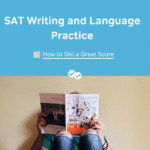Oh those SAT idioms – the bane of every SAT test taker. Yes, it is true. Even those who have an ear for the proper idioms often find the rest of the writing section a breeze. While there is no one way to master idioms, a combination of approaches should help.
One approach is practice questions. The College Board book is filled with them. The other publishers also have a fair number of problems for you to test you ability on idioms.
Below are two of my own. The first is your standard five-answer choice, identifying the error question. The second is an identifying the error on steroids.
Practice Questions
1. On her (A) recent trip to Los Angeles, Shirley had (B) not accounted for (C) the inclement weather, and instead of arriving early, as she had planned, (D) she almost missed the movie premiere. No Error. (E)
2. The recent renovations to (A) her penthouse did not agree with (B) Maria’s aesthetic sensibilities, and (C) she found herself (D) wishing she had not given (E) her interior designer free reign over (F) her domicile. No Error (G)
3. The professor derives great comfort in (A) used bookstores, often spending (B) hours at a time (C) hovering over a dog-eared copy of some tome long forgotten. (D) No Error (E)
Answers and Explanations
1. The idiom should be ‘taken into account,’ which means to consider. ‘Accounted for’ means to explain. The answer for the first question is (C).
2. Tests renovations to (which is correct) and ‘agree with’ (also correct), which means to suit in terms of taste.
This question, however, does have an error. The structure of the sentence needs a conjunction that means, ‘as a result of’ instead of the word ‘and.’ So’ does the trick. The answer is (C).
3. This is a challenge question!
Many students would choose (D), mainly because it sounds weird. However, you should always be on guard against your ear when dealing with difficult questions.
We know this question is difficult because it is a #28 question. (The Identifying the Error section covers question 12 – 29 on the Writing Section, with question #12 being the easiest and #29 being the hardest).
The more likely culprit in this case is the preposition ‘in’. Typically when you see a line under a preposition – the preposition may or may not be accompanied by another word – the question is testing an idiom. Whether the idiom is the correct is up to you.
There is no magical way to game the system…but I would say there is a greater than 50% chance the idiom is incorrect.
However, I wouldn’t put too much stock in this – some students adhere so literally to the “no more than five underlined (E) no errors” theory that they will change answers they know are incorrect just so they don’t go over the five quota limit. (Again, do not start practicing this “voodoo SAT.”)
Okay, back to the question at hand: ‘in’ is underlined. Is the idiom correct? Do you derive great comfort ‘in’ something or should the ‘in’ be replaced with another preposition?
There is no logical reason why one preposition should follow derive and not another. In this case, the preposition ‘from’ always follows derive, so the answer should be (A), and the correct sentence should read, “the professor derives great comfort from…”






Leave a Reply